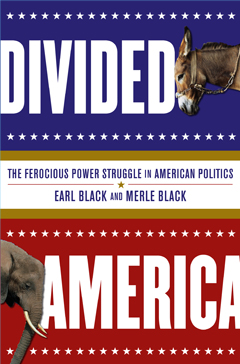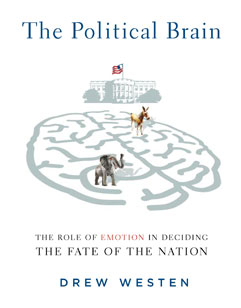April 28, 2008
White, Working-Class Voters a Tough Sell for Democrats
In a new study for the Brookings Institution, Emory political scientist Alan Abramowitz and visiting fellow Ruy Teixeira analyze dramatic demographic shifts along class lines since World War II.>>
More election and political headlines
Top Ten Things You Need to Know About the 2008 Elections
Alan Abramowitz highlights the most important items to know going into the 2008 presidential elections during an April 15 audio recording of the election forum, "New Questions for an Historic Election." >>
Books In their book, "Divided America," renowned political scientists Merle and Earl Black have found that the battle lines of America's deeply partisan national politics could easily be drawn on a United States map. >>
Emory University psychologist Drew Westen examines how, when reason and emotion collide in voters' minds, emotion invariably wins in his new book, "The Political Brain: The Role of Emotion in Deciding the Fate of the Nation." >>
Political scientist Michael Leo Owens explores the collaboration between black churches and government agencies who share the goal of community revitalization in his book, "God and Government in the Ghetto." >>
Clinton Needs Wins in N.C., in Primaries, Says Abramowitz
To change the dynamics of the Democratic race and convince superdelegates to begin moving in her direction, Hillary Clinton needs to defeat Barack Obama or hold him to a narrow win in North Carolina and score a big win in Indiana, says Emory University political scientist Alan Abramowitz.>>Election Politics Predictable, Push New Paradigms
Political experts provided insights during an election forum, titled "New Questions for an Historic Election," sponsored by political science honor society Pi Sigma Alpha.>>Faith-Based Initiatives Likely to Endure, Says Emory Author
Whatever the outcome of the 2008 election, one legacy of the Bush administration that is likely to remain a permanent part of the American landscape is faith-based initiatives, says Emory University political scientist Michael Leo Owens.>>Obama Strikes Delicate Balance on Race
Barack Obama had to deliver the speech on race in Philadelphia. Given the firestorm of controversy generated over both Geraldine Ferraro and Jeremiah Wright’s comments, ignoring racial issues could have magnified those issues in the minds of voters, permanently crippling Obama’s campaign, says Emory University political scientist Andra Gillespie.>>Election Outlook Calls for Candidates to Heal Rifts, Change Course
Emory University political scientist Andra Gillespie offers the following analysis of voting trends and the candidates' campaign strategy as both Republicans and Democrats seek to solidify their presidential candidate choices in advance of next week's primaries.>>Super Tuesday Results Leave More Questions Than Answers
Super Tuesday's results demonstrate how spectacularly competitive this nomination contest has been, and a more detailed analysis of the exit polls reveals some interesting trends and non-trends, says Emory University political scientist Andra Gillespie.>>Independents Hold the Cards for Super Tuesday
Independents are playing a major role in the presidential nomination race in both parties, and could make the difference in a win or loss for Republican John McCain and Democrat Barack Obama, says Emory University political scientist Alan Abramowitz.>>Florida Results Add Clues to Complex Race for Both Parties
John McCain established himself as the Republican frontrunner with his victory Tuesday night, while Hillary Clinton’s victory in the Democratic primary proves she is still very viable, says Emory political scientist Andra Gillespie.>>Obama's S.C. Victory Impressive, but not Decisive, Says Emory's Gillespie
Barack Obama's two-to-one victory over Hillary Clinton was absolutely impressive, but it is by no means decisive in the Democratic nominating process, says Emory University political scientist Andra Gillespie.>>Michigan Primary Results Hint at Trouble for Party Leaders
The results of last night's Michigan presidential primary contained some important clues about the future of the Republican and Democratic nomination contests, says Alan Abramowitz, Emory University political scientist and polling expert.>>New Hampshire Defies Polls
A record turnout of voters in the New Hampshire primary Jan. 8 delivered a surprise comeback for Hillary Clinton and boosted John McCain's bid. The following Emory experts weigh in on what remain lively and fluid races for the Presidential nominations of both parties.>>Spending Drives New Hampshire Effect, Says Emory Economist
Candidates who win the New Hampshire primary historically have a 60 percent chance of winning the nomination, "which is very high, given that there is still a large number of candidates and primaries to go in the race," says Tilman Klumpp, an assistant professor of economics at Emory University in Atlanta.>>
Early Forecast Calls for Dems in 2008
The next occupant of the White House is likely to be a Democrat, according to an early forecast by Emory University political scientist and polling expert Alan Abramowitz.>>
[an error occurred while processing this directive]
[an error occurred while processing this directive]
| calendar | directory | employment | search | help | site index | emory home page |




